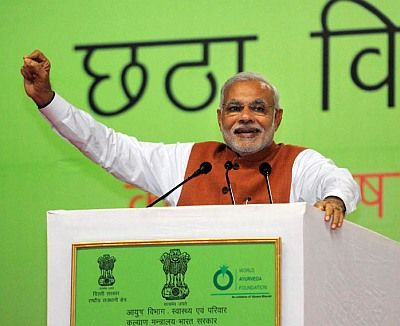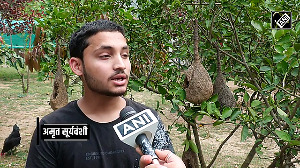 Narendra Modi's ministry expansion makes disdain clear for others who are supposedly allies, quite unlike the Vajpayee-led National Democratic Alliance. Kavita Chowdhury reports
Narendra Modi's ministry expansion makes disdain clear for others who are supposedly allies, quite unlike the Vajpayee-led National Democratic Alliance. Kavita Chowdhury reports
Only one ally of the ruling Bharatiya Janata Party was inducted in the first expansion-sum-reshuffle of the Narendra Modi government, nearly six months after it came to office.
And, even this was in the rank of a minister of state.
This tells its own story of the relationship between the BJP, which has come to power on its own, and the rest of the National Democratic Alliance.
The Telugu Desam Party's Y S Chowdary was named minister on the recommendation of party head N Chandrababu Naidu. He is the second TDP member to join the government, after Ashok Gajapathi Raju, minister for civil aviation.
This reshuffle might go down in history as having caused a serious, possibly permanent, rift between the ally for the longest while, the Shiv Sena, a founder-member of the NDA.
Not only did the BJP get estranged Sena member Suresh Prabhu to break from his party and join the BJP (after which he was inducted as a member of the Cabinet) but when the party insisted on linking the issue of joining the Maharashtra government with that in Delhi, the BJP simply opted to drop the Sena nominee, Anil Desai from the list of invitees.
The communique issued by the President of India had just one terse sentence referring to a possible permanent parting of ways: it referred to Desai's "unavailability" as the reason he was not administered the oath of office.
The status of the current Sena MP in the council of ministers, Anant Geete, is uncertain.
Till late Sunday night, he had not resigned from office.
The Akali Dal, Lok Janshakti Party and Rashtriya Lok Samata Party all have single representatives in the ministry. It is clear that as the BJP's stars are in the ascendance, it has less and less time for alliance partners.
Upendra Kushwaha of the RLSP was expecting a full Cabinet berth. He continues to be a MoS, not even with independent charge.
Other NDA allies like the Nagaland People's Front and National People's Party in Meghalaya (have one MP each in the Lok Sabha) had no representation in the council and this continues.
Members of the BJP, whether from Arunachal Pradesh or Assam, are the only representatives of the northeast in Delhi.
That no other Akali Dal MP (Harsimrat Kaur Badal remains the only SAD face) has been inducted is indicative of the increasingly strained ties between them and the BJP in Punjab.
By the time the state goes to polls again, whether the SAD-BJP alliance will stay intact is a question many in the BJP are asking.
That a BJP member from Punjab -- Vijay Sampla from Hoshiarpur -- has been chosen for elevation to the council of ministers suggests the BJP is keen to expand its own sphere of influence in Punjab, where it has all along been a junior partner of the SAD.
Even when Modi had announced his Cabinet in June, there were rumblings of discontent from LJP chief Ram Vilas Paswan, unhappy with his consumer affairs, food and public distribution portfolio; nothing came of it.
In the Modi-led BJP's scheme of things, asserting the BJP's supremacy across states is a feature, underlining the stellar position it enjoys at the Centre.
Termed "arrogant" by the Sena, this present BJP is certainly in an aggressive mode, focused on its target of gaining a pan-India presence, like the Congress in the past.
Comparisons with the NDA under Vajpayee are obvious. That was a rainbow coalition, with the government subject to pulls and pressures of allies and the government being more accommodative. This one is a far cry from that, with a marginal presence of allies and none of these handling any of the key portfolios.
The present NDA is but a reflection of the one man-centric party the BJP has become. The party itself, heady with the success of Modi, has little room or need for others, it seems to show.












 © 2025
© 2025